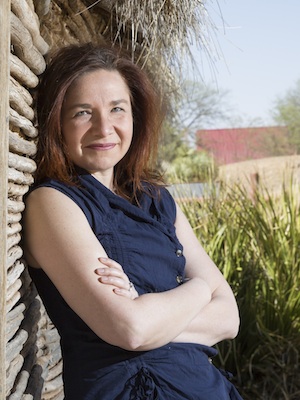 In December 2011, talk radio mogul and sometime drug addict Rush Limbaugh decided to rile up his listeners by announcing “Newt Teams Up With Climate Babe Hayhoe for New Book” (referring, first, to serial philanderer and former Speaker of the House Newt Gingrich and then to Texas Tech professor Katherine Hayhoe).
In December 2011, talk radio mogul and sometime drug addict Rush Limbaugh decided to rile up his listeners by announcing “Newt Teams Up With Climate Babe Hayhoe for New Book” (referring, first, to serial philanderer and former Speaker of the House Newt Gingrich and then to Texas Tech professor Katherine Hayhoe).
Rush was upset that Hayhoe had said “Among climate scientists, people who spend their lives researching our world, there’s no debate regarding the reality of climate change and the fact that humans are the primary cause,” and he seemed especially incensed that she had said, “It is primarily laypeople like talk show hosts who are perpetuating the idea that there is no scientific consensus.” And, in the runup to the 2012 elections, he was outraged that Gingrich would issue a book with “a chapter written by a babe named Hayhoe” and which would acknowledge the reality of climate change.
In the end, Hayhoe’s chapter didn’t make it into Gingrich’s book, and Gingrich’s presidential hopes ended a few months later.
Luckily, Hayhoe’s writing career didn’t begin or end there. She’s served as an expert reviewer for reports from the Intergovernmental Panel on Climate Change, and co-author on major US government reports on climate change (including the 3rd National Climate Assessment, published in 2014). For the American Association for the Advancement of Science, she helped develop the fascinating What We Know website. Her research on climate change has produced over 120 peer reviewed papers, focused on modeling likely impacts of climate change.
Impressive as her research is, and ennobling as Rush Limbaugh’s hatred might be, those are not the reasons we picked Katherine Hayhoe as one of NCSE’s Friend of the Planet award-winners for 2016.
The reason Hayhoe deserves this honor is, quite simply, that she is “perhaps the best communicator on climate change.” Don’t take my word for it: John Abraham, a fellow FOP awardee, described her that way in a fascinating profile by Neela Banerjee. Since Abraham made that comment, Hayhoe has only become more effective. She’s also been honored with the American Geophysical Union’s Climate Communication Prize, given to her the same year Time magazine listed her among the 100 Most Influential People and Foreign Policy placed her among their 100 Leading Global Thinkers. She’s received similar honors and recognition from her university, other professional societies, and even Christianity Today, which selected her in 2012 as one of their 50 Women to Watch.
In 2014, she served as an advisor to the producers of Years of Living Dangerously, the star-studded Showtime series chronicling how climate change is already affecting people’s lives; the show won an Emmy for Best Non-fiction or Documentary Series (edging out Cosmos). She was also one of the show’s stars, with Don Cheadle following her as she spoke about climate change to a conservative, evangelical church group in Texas.
The episode is a window into what makes Hayhoe so effective. First, she wasn’t just some scientist parachuting in to speak to these conservative evangelicals. She is a conservative evangelical Christian, and her religion is one reason climate change is such an important topic for her. That simple fact means that she can reach people who might otherwise not listen (even, briefly, Newt Gingrich).
She is also a calm, generous, and sympathetic speaker and writer. In part, this is just her personality, but she’s also had ample opportunity to practice. Her husband Andrew Farley, an evangelical minister and linguistics professor, didn’t think climate change was real when their relationship started. As Banerjee’s profile explains:
Like many American evangelicals, Farley grew up thinking that environmentalism was a leftist cause. “I saw climate change as the same as saving the whales, hugging trees and wearing hemp,” he said.
As Hayhoe’s reputation grew, several of Farley’s close friends voiced disapproval of her research, and he raised objections too. To answer Farley’s questions, Hayhoe showed him data that reveal, for instance, how Earth’s temperature has risen markedly after the Industrial Revolution — as the combustion of fossil fuels grew.
Those conversations were enough to convince him, and he joins her in climate change outreach to evangelical communities: the two co-authored A Climate for Change: Global Warming Facts for Faith-Based Decisions.
Not only is she skilled at connecting with her audience, whether it be a lone spouse or an auditorium, she also knows how to connect science to people’s immediate needs. As Hurricane Sandy moved up the eastern seaboard in 2013, it was fascinating to watch her on Twitter describing how climate change was increasing the storm’s strength and destructive power. It took an uncanny depth of knowledge to do that commentary on the fly and with scientific rigor, but it took a special sort of empathy and communications instinct to do so responsibly even as a tragedy was unfolding.
In the end, it is that ability to build bridges that makes Katharine Hayhoe so deserving of her Friend of the Planet Award. Her ability to bridge empathy and knowledge, science and faith, liberal and conservative, science and humanities, strength and grace, stands as an example to us all of what it will take to set our nation and our world on a path to confronting and addressing the threats posed by climate change.

